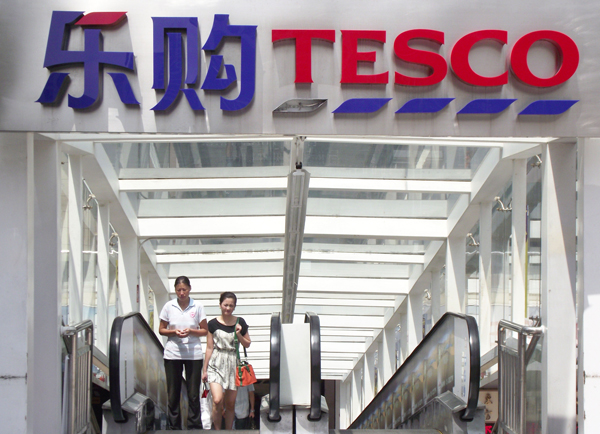CRV-Tesco deal offers opportunity for new identity with consumers
Retail | Mike Bastin
It came as no surprise when China Resource Vanguard, one of China's largest (State-owned) supermarket chains, announced it had completed the takeover of Tesco's business on the Chinese mainland.
Tesco remains the largest food retailer in the United Kingdom and one of the largest across Europe but has struggled since entering China in 2004. CRV has invested heavily on the mainland with almost $3 billion required to control an 80 percent stake in the newly formed joint venture (JV). Tesco will retain a 20 percent interest.
But of most significance is CRV's now unequivocal commitment to "rebrand" each of Tesco's 155 stores across mainland China.
|
A Tesco outlet in Changzhou, Jiangsu province. China Resource Vanguard announced it had completed the takeover of Tesco's supermarket chain on the Chinese mainland. CFP |
Much has been said about the need for more ambition, confidence and, above all, belief in the potential for Chinese brands and a Chinese brand image.
It is, therefore, immensely encouraging to witness the bold move by CRV in, first of all, acquiring one of the world's largest food retailers, but also, crucially, having the confidence in its own brand's potential.
At the same time, it is also a shrewd move to retain Tesco as a minority JV partner. The UK retailer's international experience and know-how may prove invaluable as CRV embarks on first national and then global brand expansion.
For far too long, Chinese companies have not only hidden behind their Chinese brand identity but in many cases have actually made strenuous efforts to replace it with some sort of foreign brand image, association and appearance. Nike, Adidas and Starbucks are just three examples of famous foreign brands the image and appearance of which Chinese competitors have attempted to emulate.
Let's hope that CRV's audacious removal of the Tesco brand is the start of sizable number of Chinese companies also demonstrating faith in their Chinese identity and eschewing the fickle, short-term "brand copycat" business model so fondly embraced by far too many Chinese companies.
As brands and branding require far more associations that build a strong, emotional attachment in the minds of the target market, China, with its 5,000-year history so rich in cultural and artistic content, offers a plentiful supply of suitable opportunities.
CRV's Tesco rebranding places it in a very strong position domestically where few corporate and product brands dominate nationally. Retailers that come closest to national brands are possibly Suning and Gome, China's dominant consumer electronics and home appliances retail brands. But even here, strong regional disparities can be seen in market share distribution, with Suning enjoying far greater market penetration across South China.
Tesco's mainland China stores, once rebranded under the CR Vanguard name, will combine with CRV's existing outlets to form a total of 3,970 stores and shopping malls across China.
Major foreign food retailer competitors will be dwarfed. French food retailer Carrefour, which first penetrated comparatively early in 1995, can only boast 236 mainland China stores, and US arch-rival Walmart cannot do much better with around 400 stores in China.
In addition, Carrefour and Walmart also demonstrate a strong regional bias, with the former far stronger in North China, while the latter has penetrated in the south more.
But in order to seize what appears to be a golden opportunity for CRV to build the first truly national retail brand across mainland China, it has to move fast.
CRV needs to develop an engaging, open relationship with Tesco's management. Tesco's rise to the top in the UK can only be a benefit as CRV attempts to replicate the achievement across China.
This should be seen as an invaluable relationship with input considered vital at all times.
CRV also needs to move fast to develop its online offerings and brand image. Supply chain integration across online and offline operations is also essential.
But above all, CRV needs to build quickly on the decision to remove the Tesco brand identity from its stores and announce several major Chinese brand associations in order to demonstrate commitment not only to a Chinese brand but, crucially, to a Chinese brand image.
The author is a visiting professor at the University of International Business and Economics in Beijing and a senior lecturer on marketing at Southampton Solent University's School of Business. The views do not necessarily reflect those of China Daily.



















